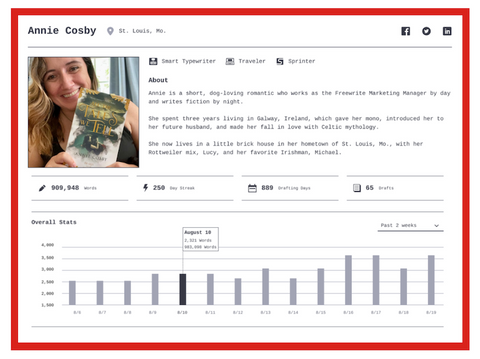
Mark your milestones and celebrate each step of the writing journey with a Postbox profile.
Our favorite thing is being part of your unique writing journey. From page one to "the end," from book one to book six, we're cheering you on every step of the way. And we think the rest of the world should, too.
That's why we've created Postbox profiles. 🎉

With a profile on Postbox, you can:
- track writing milestones on your Freewrite (or our free app, Sprinter)
- view graphs that illustrate your progress
- create a profile that showcases you as a writer with a bio, photo, and social media links
- reserve a unique URL to share with readers and friends (or keep your profile private, if you prefer! 🔐)
This is a free feature available to everyone with a Postbox account.
So what are you waiting for? Create your profile today, challenge yourself to a new writing goal, and bring friends along for the journey!
The Stats
Postbox aggregates your writing statistics based on (1) your activity on your Freewrite device or in Sprinter, and (2) drafts currently in your Postbox account and archive. Here are three of our favorite stats you can track:
-
Word Count: Keeping track of how many words you've written is a great metric for quantifying progress and lifting spirits in the day to day grind. Your profile will display how many words you've written in your Postbox account and archive.
Note: The "Archive" function removes a document from your Postbox timeline and connected devices — but keeps a copy in your Postbox archive. The "Shred" action removes a draft permanently and deducts it from your word count stats. ⚠️ - Writing Streak: For every consecutive day that you write on your Freewrite, you'll add one more day to your writing streak. Looking to create a consistent writing practice? Let's see how long your streak is!
- Drafting Days: Each day you write on your Freewrite will count toward one writing day. Remember: Every day you write is a good day.
We'll soon be adding even more special features, like badges that you can earn and display on your profile for major milestones! ✍🏽
How To Claim Your Profile
Even if you'd like to keep your profile private, we recommend going through the steps below in order to claim your unique pen name URL.
- On your phone or computer, go to Postbox.GetFreewrite.com and log in to your Postbox account. Note: If you do not yet have a Postbox account, you can create one by using our free in-browser drafting tool, Sprinter. Simply begin writing and then select "Not saved." You will then be guided through the steps of creating a free Postbox account.
- Navigate to the "My Account" page.
- If the "Pen Name" field is already filled out, congratulations! You have a profile. It will be automatically set to private. To set it to public so you can share your stats with the community, select "Everyone (public)."
- If your "Pen Name" field is not filled out yet, go ahead and fill that out. It can be your real name, your pen name, or even a nickname. This must be unique within the community, so if your preferred pen name is already taken, try adding a middle initial or a number at the end. Make sure to set your profile to public if you want to be able to share!
- Add your location, bio, a profile picture, and your social media accounts so people can learn more about you and your work.
- In the "Your Link" section, you'll find your unique URL to share with family and friends or on social media. Click "View Profile" to see what your profile looks like!
Questions? Email us at hello@getfreewrite.com and we'd be happy to help.




















